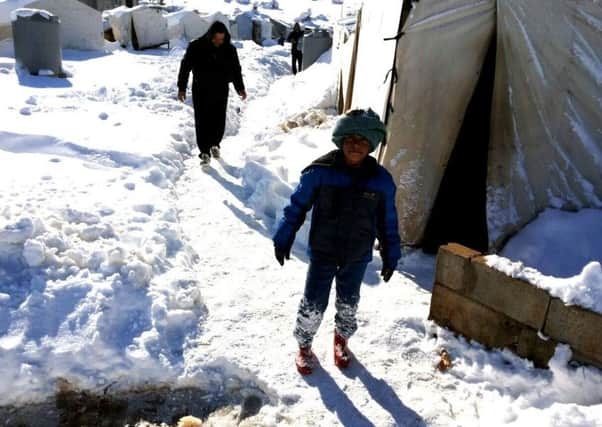Edinburgh Direct Aid launches winter appeal to aid Syrians in Lebanon


Encircled by a virtual no-man’s land between the town and the Syrian border to the east and a number of Lebanese army checkpoints in every direction, it is very much on the forgotten front line against militant groups Islamic State and Nusra Front.
Two years ago, it was the road Maggie Tookey found herself on as part of a convoy ferrying vital supplies to the town.
Advertisement
Hide AdAdvertisement
Hide AdAs field operations director for Edinburgh Direct Aid (EDA) – which today launched its winter appeal – she was tasked with assisting in the transporting of clothes, sewing machines and computers from the Capital when a group of militants launched an attack on the town and its 70,000 refugees from Syria who live in makeshift tents in the surrounding area.
“We were about halfway up the road from Beirut when we got stopped at the checkpoint,” Maggie recalls.
“The Lebanese army stopped us and told us we couldn’t pass, then we heard the explosions from shelling and gunfire.”
The siege lasted for around five days, after which Maggie became the first volunteer back on the scene in Arsal – with three desperately needed truckloads of supplies.
Advertisement
Hide AdAdvertisement
Hide Ad“The refugee camps are so close together, as soon as the shelling set fire to one, it was like a domino effect – they all went.”
For a country with a population of 3.5 million, Lebanon has taken on a massively disproportionate amount of refugees. More than a million have arrived from neighbouring Syria, with three times Arsal’s regular population settling in camps around the town.
The dusty, arid landscape, 80 miles from Beirut and 5000 metres above sea level – higher than Ben Nevis – already makes for difficult living conditions, but temperatures plummet from an average of 34C in the summer to minus 10 in the winter, when the entire region becomes blanketed in snowfall.
Since 2013, EDA has taken more than 30 tonnes of donations to the town and, as chairman Denis Rutovitz points out, thanks to Qatar’s Red Crescent organisation, it is now able to transport more provisions to the conflict-stricken region.
Advertisement
Hide AdAdvertisement
Hide Ad“They offered to help us with transporting our cargo, which is massive because while we’ve never been short of donations, transporting it has been an issue,” he said.
“Shipping containers are huge, they can carry about 10 tonnes, but it costs around £2000 to hire one and then there’s actually getting it over there. It’s expensive, but with their help we can ask for more, so we can help more people.”
Winter donations can be made to its Granton warehouse and with no upper limit on the amount it can transport, it is also putting out the call for volunteers to help sort and pack the clothing.
Padded jackets, fleeces, thermals, good shoes and boots and basic medical supplies such as painkillers, plasters and disinfectants are all highly requested, while toiletries such as towels, razors and toothpaste are also on the list.
Advertisement
Hide AdAdvertisement
Hide AdThe donations will be sent out in several journeys between now and December but, as Denis points out, the work EDA is doing is more than aesthetic.
“The two main industries in Arsal were the stone quarry and the cherry orchard but both of those are now in no-man’s land,” he said. “There were two people who decided to try and go up to their orchard a few months ago and they were taken out by a sniper.
“We’ve managed to establish a training centre which trains young men and women in plumbing, solar panel installation and mobile phone repair – things like that which make sure they have some prospects.
“Thanks to donations of sewing machines, we’re able to make hospital drapes from specialist material shipped from Dundee which are then sent all over Lebanon and the workers get paid for it.”
Advertisement
Hide AdAdvertisement
Hide AdThe charity has made great strides from the tragedy that almost forced it to close its doors 23 years ago. During the Bosnian conflict, just a year after EDA begun operations, a number of volunteers bravely drove medicines and supplies into Sarajevo with the city still under siege in 1993. One aid worker, Christine Witcutt, from Wishaw, was killed by a sniper as she travelled into the city.
When Nicola Sturgeon travelled to Srebrenica last week, the site of one of the most horrific genocides in modern conflict, she visited the Christine Witcutt Day Care Centre for children with special needs.
“That was a hugely difficult period for us all,” says Denis, who with wife Jeanne set up the organisation about six months before Christine’s death in July 1993.
“We were ready to give up, I think it was a real sense of shock. We know what we do is dangerous but this was real. It was Christine’s husband, Alan, who told us to keep going and keep working in these places. He thought that was the best way to honour her memory.”